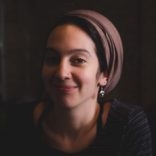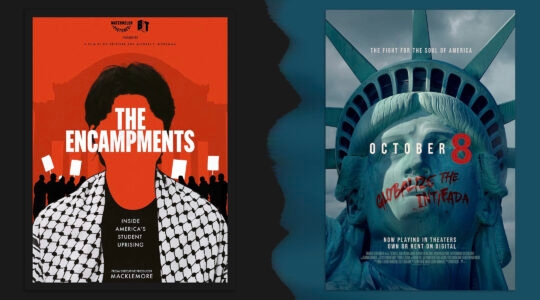This story was originally published on My Jewish Learning.
(JTA) — Over a recent dinner with a diverse group of college friends, we identified a common source of angst, a first for our 15 years of friendship: saying what we think.
From the privileged place we sat that evening in New York City, we absorbed the tragic reality of the war in Israel and Gaza. The hearing of the House Committee on Education, in which the presidents of three leading universities issued halting responses to the question of whether calling for the genocide of Jews constituted harassment, had transpired several weeks earlier. Some of us had experienced direct antisemitism in the wake of the attacks of Oct. 7 and were sharply aware of how the politics of the moment put Jews in danger. Others felt that, given the United States’ direct funding relationship with Israel, the moment presented a unique chance to take grassroots action on matters of foreign policy.
At the dinner table, we spoke openly about our feelings even as we agreed that making any sort of public comment was risky. We each knew people who had articulated opinions in a public forum and had lost friends, work and respect as a consequence. We were losing our courage to speak up.
The French philosopher Gaston Bachelard wrote: “What is the source of our first suffering? It lies in the fact that we hesitated to speak. It was born in the moments when we accumulated silent things within us.”
I first came across this profound quote in an essay by Torah scholar Avivah Gottlieb Zornberg in her brilliant work “The Particulars of Rapture: Reflections on Exodus.” Zornberg connects Bachelard’s concept of accumulated silence to the speechlessness of Moses, whose struggle with speech we encounter in this week’s Torah portion, Vaera. At this point in the story, God has appeared to Moses and asked him to assume leadership of the enslaved Israelites and request their liberation from Pharaoh. But Moses has so far failed in this, resulting in rage from the Egyptians and general apathy from the Jews.
Typically, when we think about Moses’ speech difficulties, we presume them to result from a physical disability. Arel s’fatayim is the phrase Moses uses in protesting God’s charge to speak to Pharoah. Often translated as “tongue-tied,” the commentator Rashi says it means “obstructed.” And a famous Midrash teaches that Moses’ struggles stem from a burning of the tongue he suffered in childhood in the Pharaoh’s palace. But in Zornberg’s assessment, “Moses’ own experience of speechlessness is a mirror of the deafness around him.” In other words, Moses’ inability to speak is a reflection of those around him — especially his Israelite peers who, overcome by the crushing weight, physical and spiritual, of their bondage, are unable to hear him. In their miserable condition, they cannot listen to someone suggesting that a change is possible. Moses’ speech problems are spiritual in origin, not physical.
I empathize with Moses. If I can barely work up the courage to write the text for an Instagram post, how could I possibly judge Moses, whose audience is as tormented and despaired as they come? But in today’s world of muting and blocking, I also find myself wondering: What came first — the speechlessness or the deafness? For the Jews in Egypt, an oppressive reality obscured their hearing. For Moses, self-doubt obstructs his ability to speak. To argue about which came first is a chicken-or-egg problem: Both speaking and listening required going strongly against the grain.
What is striking about Moses’ humble rise to leadership is that it’s also a story about the beginnings of courage. Supported by his brother Aaron and God’s supernatural interventions in the Egyptian court, Moses seems to develop greater confidence with the passing of each plague. As the second plague unfolds, Moses begins clever negotiations with Pharaoh. Around the third plague, God makes a point of telling Moses that the Israelite encampment will be spared the effects of the plagues, thereby helping Moses build goodwill among his people. And by the time the fourth plague hits, Moses is having a full conversation with Pharaoh, advocating for the Israelites’ right to worship outside the land of Egypt. The man who began as a hesitant spokesperson fearing the rage and apathy of his audience has emerged as a leader and liberator.
Perhaps the courage to believe in change is the toughest kind of courage to cultivate — more difficult even than the courage to speak, to hear, or to lead. Yet it’s the courage to believe in the possibility of change that ultimately sets the Jews on the path to freedom. Gradually, they overcome both speechlessness and deafness as they witness real changes to the status quo, changes they believed were impossible.
Will we today regain the courage to say what we think, to hear what we don’t want to hear? To set ourselves on this path, it’s worth learning from the early days of Moses’ leadership. Courage is not necessarily born to us, but it is something we can build. And the first step is to believe, in some small way, that the impossible can change. Sometimes all it takes to fuel that belief is an intimate dinner with old friends to remind us that we’re not alone.
JTA has documented Jewish history in real-time for over a century. Keep our journalism strong by joining us in supporting independent, award-winning reporting.







